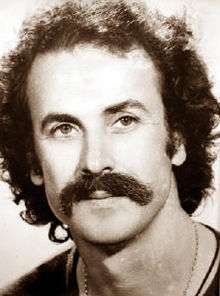Nikos Xilouris
| Nikos Xylouris | |
|---|---|
 | |
| Background information | |
| Born | July 7, 1936 |
| Origin | Anogeia, Crete, Greece |
| Died | February 8, 1980 (aged 43) |
| Occupation(s) | Composer, singer |
| Notable instruments | |
| Lyra (Cretan) | |
Nikos Xylouris (Greek: Νίκος Ξυλούρης; 7 July 1936 – 8 February 1980), nicknamed Psaronikos (Greek: Ψαρονίκος), was a Greek composer and singer from the village of Anogeia in Crete and also the older brother of two other great musicians of Cretan music, Antonis Xylouris or Psarantonis (Greek: Ψαραντώνης) and Yiannis Xylouris or (Psaroyiannis) (Greek: Ψαρογιάννης). His songs and music captured and described the Greek psyche and demeanor, gaining himself the title the archangel of Crete.
Biography
Psaronikos is a nickname as it is customary for people in Anogeia to have. Xilouris' grandfather was Psarantonis. His grandfather kept company with a group of five or six men who stole from the Turks. As he was the fastest runner in the group, when they met with Turks he was running very fast and he could catch all of them as if they were fish. So, first he was given the name Fishturk (Greek: 'Ψαρότουρκος') and then the nickname Psarantonis. That is how all family male members after him were nicknamed Psaronikos, Psarogiorgis, Psarantonis etc. (this is explained by Psarantonis, Nikos Xylouris' brother in an interview presented on his homepage).
In 1944, when Xylouris was eight years old, Anogeia was razed by the German army and his family was forced to move to another village. He acquired his first lyra at the age of twelve and displayed potential to play local folk music. Xylouris was 17 years of age when he started performances at Kastro folk music-restaurant in Heraklion.
A turning point in Nikos Xylouris' career occurred with a recording in 1958. He first performed outside Greece in 1966 and won the first prize in the San Remo folk music festival. In 1967 he established the first Cretan Music Hall, Erotokritos, in Heraklion. The recording of Anyfantou in 1969 was a big success. Xylouris soon started performances in Athens, which became his new permanent residence, at the Konaki folk music hall.
During the early 1970s, Xylouris' voice becomes identified not only with Cretan music but also with the new kind of artistic popular music that emerged as well-known composers such as Giannis Markopoulos, Stavros Xarhakos, Christodoulos Halaris, and Christos Leontis wrote music on the verses of famous Greek poets among which stand out Nikos Gatsos, Yannis Ritsos, Giorgos Seferis, Kostas Varnalis, and Dionysios Solomos. In 1971, Xylouris is awarded by the Academy Charles Cross of France for his performance in the Cretan Rizitika songs album with G. Markopoulos.
He died in 1980 from a brain tumor, and is buried in the First Cemetery of Athens.
See also
External links
- http://cretanhistory.tripod.com/biograf/xiloyris.htm
- Musical, political and social portrait of Nikos Xylouris
- Nikos Xilouris on YouTube